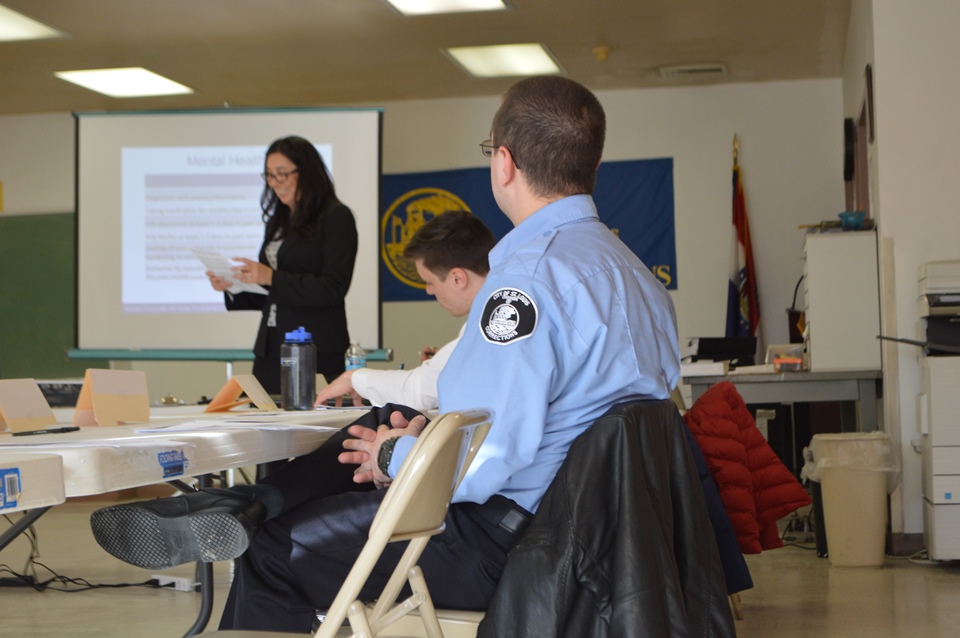SLU Establishes Reentry Program To Help Incarcerated Individuals
Saint Louis University is partnering with the City of St. Louis Division of Corrections in a new, multipronged program to create services and provide support to incarcerated women and men before and after they are released from the St. Louis City Jail and the facility known as the workhouse, a medium-security institution on Hall Street.
The goal is to help incarcerated individuals to re-acclimate to the community by providing training, support and services they need to be productive, law-abiding citizens, said Karen Barney, Ph.D., a professor emerita in occupational science and occupational therapy at Saint Louis University.
“The fact is that in this country and in our city, we have high rates of recidivism,” Barney said. “To be successful, we need to facilitate a wide range of services and support that are particular to each individual.”
“When we work with individuals who are soon to be released, we will meet with them and consider what are each individual’s occupational needs and what services we can provide and recommend to support a sustainable transition to employment and community living,” said Lisa Jaegers, Ph.D., assistant professor of occupational science and occupational therapy. “It is, in essence, a triage of university and community-based services facilitated by an occupational therapist pre-release, and bridged to a post-release therapist.”
This new program will allow individuals to tap a wide range of university offerings and expertise, Barney said. So far, 21 academic units and services have been identified to provide support in some capacity, she said.
The plan is for each soon-to-be parolee to be enrolled in a six-week intensive training program before leaving the jail. Once released, the support would continue in the form of job placement, life skills, and, as needed, mental health resources or interventions for past substance use, social services and more.
“We are pulling faculty and resources across the SLU and the St. Louis communities,” Barney said. “We have people from law, business, career services, nursing, medicine, Doisy College of Health Sciences, Public Health and Social Justice and more.”
Barney and Jaegers are also seeking employers who are willing to hire people with a record of incarceration to work in living wage jobs. As an example, the St. Louis Carpenters’ Joint Apprenticeship Program has offered its support to work pre- and post-release with individuals who are interested in construction trade careers.
With the University's support, we have a high level of confidence in new successes for those coming back to our community.”
St. Louis City Mayor Francis Slay
To serve as the staff member for the program, SLU just hired Brittany Conners, an alumna who earned both of her degrees at the Doisy College. She completed her bachelor’s degree in occupational science in 2013 and her master’s degree in occupational therapy in 2014.
While her office is in the City Justice Center, Conners is a SLU employee. She works at both the medium-security institution and the city jail. There, she will collaborate with St. Louis City Jail Commissioner Dale Glass and his reentry team, led by Robin Edwards, correctional program manager, to interact directly with inmates, helping them discover their potential – something St. Louis Mayor Francis Slay supports.
“Partners like Saint Louis University help us provide an expert level of service and opportunities for some of our most vulnerable residents,” Slay said. “With the University's support, we have a high level of confidence in new successes for those coming back to our community.”
Glass, Training Academy director Nita Curd, and a team of officers and city representatives originally partnered with Jaegers for correctional officer health initiatives that continue. Jaegers’ participatory team studies the mental and physical health needs of officers and continues to identify workplace health programming to address those needs.
Ultimately, Barney and Jaegers are leading an effort that could redefine the way correctional workplace health and an institutional reentry program can be shaped to address the jail’s mission to safeguard staff and improve reentry.
“Public health research continually shows that access to support services reduces recidivism, promotes social cohesion and lowers crime rates,” Slay said.
Barney and Jaegers note that each person’s successful reentry into the community fosters a paradigm shift, focusing on habilitation for those who do not have experience with carrying out independent living skills and rehabilitation, rather than limiting daily activities. The new program speaks to SLU’s mission and the University’s Jesuit values, said President Fred P. Pestello, Ph.D.
“As with all things we do, it is important to reflect on how each action fulfills and furthers our values,” Pestello said. “This incarceration reentry program is rooted in the Catholic Corporal Works of Mercy and grows from our University and Jesuit mission.”
This holistic and collaborative approach reflects SLU’s mission of educating the whole person, mind, body and spirit. It is about identifying what they need for success and offering them a new outlook – it serves as an affirmation of their worth and opens the door for potential and opportunity in a way that may not have been available before.
“As a matter of social justice, extending mercy to the most vulnerable in society and aiding in their development to reach their fullest potential is a moral imperative,” Pestello said. “I am incredibly proud of the efforts the SLU community continues to make to bridge the gap between ‘us’ and ‘them.’”
Pooling SLU’s extensive resources, the program will facilitate occupational/employment services, counseling, nutrition, health literacy and a host of other support assistance to equip former offenders to be productive citizens, Barney said.
“We want to redirect them to learn new skills, new habits and to find options of what to do in their leisure time,” she said. “It is important that the transition is seamless so that once they are outside of the correctional system, they have new ways to live and work productively so that they do not reenter it.”


















